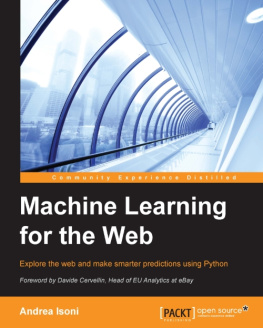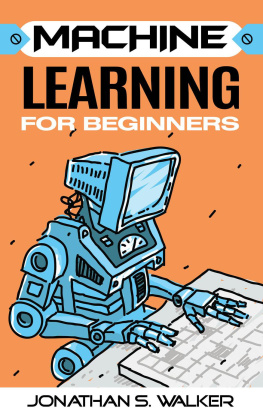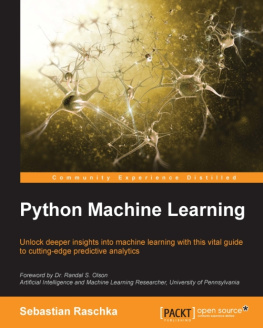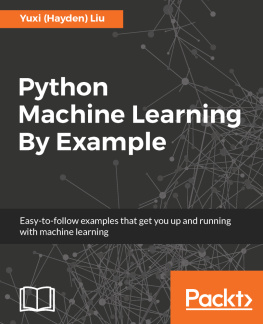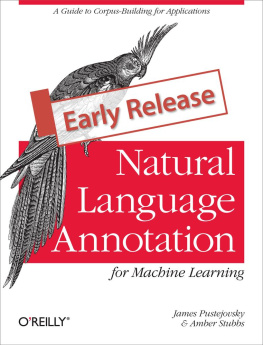Cervellin Davide - Machine learning for the web: explore the web and make smarter predictions using Python
Here you can read online Cervellin Davide - Machine learning for the web: explore the web and make smarter predictions using Python full text of the book (entire story) in english for free. Download pdf and epub, get meaning, cover and reviews about this ebook. City: Birmingham, year: 2016, publisher: Packt Publishing, genre: Computer. Description of the work, (preface) as well as reviews are available. Best literature library LitArk.com created for fans of good reading and offers a wide selection of genres:
Romance novel
Science fiction
Adventure
Detective
Science
History
Home and family
Prose
Art
Politics
Computer
Non-fiction
Religion
Business
Children
Humor
Choose a favorite category and find really read worthwhile books. Enjoy immersion in the world of imagination, feel the emotions of the characters or learn something new for yourself, make an fascinating discovery.
- Book:Machine learning for the web: explore the web and make smarter predictions using Python
- Author:
- Publisher:Packt Publishing
- Genre:
- Year:2016
- City:Birmingham
- Rating:4 / 5
- Favourites:Add to favourites
- Your mark:
- 80
- 1
- 2
- 3
- 4
- 5
Machine learning for the web: explore the web and make smarter predictions using Python: summary, description and annotation
We offer to read an annotation, description, summary or preface (depends on what the author of the book "Machine learning for the web: explore the web and make smarter predictions using Python" wrote himself). If you haven't found the necessary information about the book — write in the comments, we will try to find it.
Cervellin Davide: author's other books
Who wrote Machine learning for the web: explore the web and make smarter predictions using Python? Find out the surname, the name of the author of the book and a list of all author's works by series.
Machine learning for the web: explore the web and make smarter predictions using Python — read online for free the complete book (whole text) full work
Below is the text of the book, divided by pages. System saving the place of the last page read, allows you to conveniently read the book "Machine learning for the web: explore the web and make smarter predictions using Python" online for free, without having to search again every time where you left off. Put a bookmark, and you can go to the page where you finished reading at any time.
Font size:
Interval:
Bookmark:
Copyright 2016 Packt Publishing
All rights reserved. No part of this book may be reproduced, stored in a retrieval system, or transmitted in any form or by any means, without the prior written permission of the publisher, except in the case of brief quotations embedded in critical articles or reviews.
Every effort has been made in the preparation of this book to ensure the accuracy of the information presented. However, the information contained in this book is sold without warranty, either express or implied. Neither the author, nor Packt Publishing, and its dealers and distributors will be held liable for any damages caused or alleged to be caused directly or indirectly by this book.
Packt Publishing has endeavored to provide trademark information about all of the companies and products mentioned in this book by the appropriate use of capitals. However, Packt Publishing cannot guarantee the accuracy of this information.
First published: July 2016
Production reference: 1250716
Published by Packt Publishing Ltd.
Livery Place
35 Livery Street
Birmingham B3 2PB, UK.
ISBN 978-1-78588-660-7
www.packtpub.com
Author
Andrea Isoni
Reviewers
Chetan Khatri
Pavan Kumar Kolluru
Dipanjan Sarkar
Commissioning Editor
Akram Hussain
Acquisition Editor
Sonali Vernekar
Content Development Editor
Arun Nadar
Technical Editor
Sushant S Nadkar
Copy Editor
Vikrant Phadkay
Project Coordinator
Ritika Manoj
Proofreader
Safis Editing
Indexer
Mariammal Chettiyar
Graphics
Disha Haria
Kirk D'Penha
Abhinash Sahu
Production Coordinator
Arvindkumar Gupta
Cover Work
Arvindkumar Gupta
What is machine learning? In the past year, whether it was during a conference, a seminar or an interview, a lot of people have asked me to define machine learning. There is a lot of curiosity around what it is, as human nature requires us to define something before we begin to understand what its potential impact on our lives may be, what this new thing may mean for us in the future.
Similar to other disciplines that become suddenly popular, machine learning is not new. A lot of people in the scientific community have been working with algorithms to automate repetitive activities over time for several years now. An algorithm where the parameters are fixed is called static algorithm and its output is predictable and function only of the input variables. On the other hand, when the parameters of the algorithm are dynamic and function of external factors (most frequently, the previous outputs of the same algorithm), then it is called dynamic ts output is no longer function only of the input variables and that is the founding pillar of machine learning: a set of instructions that can learn from the data generated during previous iterations to make a better output the following time.
Scientists, developers, and engineers have been dealing with fuzzy logic, neural networks, and other kinds of machine learning techniques for years, but it is only now that this discipline is becoming popular, as its applications have left the lab and are now used in marketing, sales, and financebasically, every activity that requires the repetition of the same operation over and over again could benefit from machine learning.
The implications are easy to grasp and will have a deep impact on our society. The best way I can think of to describe what will likely happen in the next 5 to 10 years with machine learning is recalling what happened during the industrial revolution. Before the advent of the steam engine, lots of people were performing highly repetitive physical tasks, often risking their lives or their health for minimum wages; thanks to the industrial revolution, society evolved and machines took over the relevant parts of manufacturing processes, leading to improved yields, more predictable and stable outputs, improved quality of the products and new kinds of jobs, controlling the machines that were replacing physical labor. This was the first time in the history of mankind where man had delegated the responsibility for the creation of something else to a thing we had designed and invented. In the same way, machine learning will change the way data operations are performed, reducing the need of human intervention and leaving optimization to machines and algorithms. Operators will no longer have a direct control over data, but they will control algorithms that, in turn, will control data. This will allow faster execution of operations, larger datasets will be manageable by fewer people, errors will be reduced, and more stable and predictable outcomes will be guaranteed. As many things that have a deep impact on our society, it is easy to love it as it is to hate it. Lovers will praise the benefits that machine learning will drive to their lives, haters will be criticizing the fact that, in order to be effective, machine learning needs lots of iterations, hence, lots of data. Usually, the data we feed algorithms with is our own personal information.
In fact, the main applications where machine learning is taking off as a tool to improve productivity are marketing and customer support, where a deep knowledge of the customer is required to give him/her the personal service that will make the difference between a purchase or a visit or between a happy and an unhappy customer.
In marketing, for example, marketers are starting to take into consideration information, such as location, device, past purchases, what websites one has visited, weather conditions, to name just a few of the parameters that determine whether a company would decide to display its ads to a specific set of customers.
Long gone are the days of broadcasting marketing messages through untraceable media, such as TV or newspapers. Today's marketers want to know everything about who clicks and buys their products so that they can optimize creatives, spend, and allocate budget to make the best possible use of the resources at their disposal. This leads to unprecedented levels of personalization that, when exploited properly, make customers feel valued as individuals and not part of a socio-demographic group.
It is intriguing and challenging at the same time, but there is no doubt that the winners of the next decade will be those companies or individuals who can understand unstructured data and make decisions based on them in a scalable way: I see no other way than machine learning to achieve such a feat.
Andrea Isoni's book is a step into this world; reading it will be like a peek down the rabbit hole, where you'll be able to see a few applications of these techniques, mostly applied to web development, where machine learning serves to create customized websites and allow customers to see their own, optimized version of a service
If you want to futureproof your career, this is a must read; anyone dealing with data in the next decade will need to be proficient in these techniques to succeed.
Davide Cervellin , @ingdave
Head of EU Analytics at eBay
Andrea Isoni is a data scientist, PhD, and physicist professional with extensive experience in software developer positions. He has an extensive knowledge of machine learning algorithms and techniques. He also has experience with multiple languages, such as Python, C/C++, Java, JavaScript, C#, SQL, HTML, and Hadoop.
Font size:
Interval:
Bookmark:
Similar books «Machine learning for the web: explore the web and make smarter predictions using Python»
Look at similar books to Machine learning for the web: explore the web and make smarter predictions using Python. We have selected literature similar in name and meaning in the hope of providing readers with more options to find new, interesting, not yet read works.
Discussion, reviews of the book Machine learning for the web: explore the web and make smarter predictions using Python and just readers' own opinions. Leave your comments, write what you think about the work, its meaning or the main characters. Specify what exactly you liked and what you didn't like, and why you think so.

